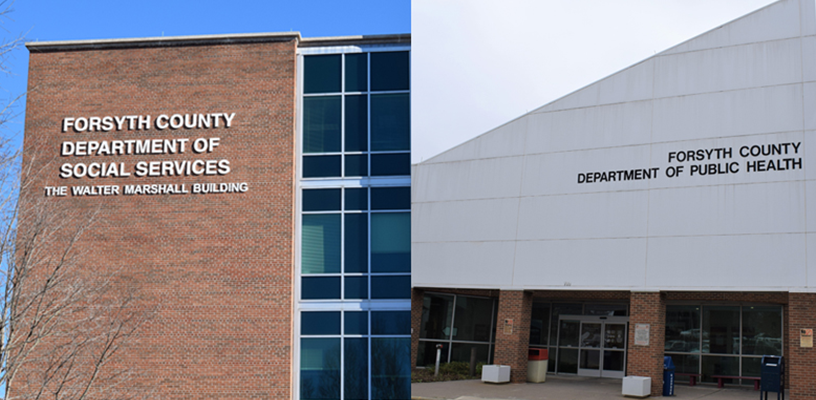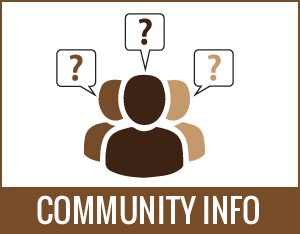
- By Todd Luck
- Posted Tuesday, April 7, 2020
Forsyth County helps those financially impacted by COVID-19
Forsyth County Government is playing a key role in helping those financially impacted by novel coronavirus (COVID-19).
Forsyth County’s Public Health and Social Services departments (Health and Human Services) have always been on the front line of helping with provision of basic needs and assisting those in various emergency situations. Daily, both departments facilitate enrollment in county, state and federal assistance programs that help with needs regarding health care, utilities, food, housing and child care. Most importantly, they have been responsive to the increase in service requests. The Board of County Commissioners recently approved $575,000 of emergency funds to assist with COVID-19 response.
“Forsyth County Health and Human Services is on the front lines of providing critical services to our citizens,” said Forsyth County Chair Dave Plyler. “Staff is continuing to work during this COVID-19 pandemic to ensure service continues as our citizens need us now more than ever. County Commissioners are appreciative of the hard work and dedication of Health and Human Services management and staff during this unprecedented time.”
Social Services, which conducts enrollment for most of the benefits programs, has an operating budget of $44.6 million, with $17.5 million coming from the county. Social Services has closed its building to the public due to COVID-19 concerns but still continues to provide services to its customers.
Even with the cessation of utility disconnection and eviction notices during the crisis, families still face accumulating bills from rent and utilities and the costs of other basic needs and we must be responsive during these complex times.
Forsyth County Health and Human Services will continue to help in a variety of ways:
Homeless Response and Community Partnerships
There is a coordinated effort between Forsyth County Government, City of Winston-Salem and Continuum of Care members to address the needs of the homeless population. Health and Human Services is assisting with housing and providing services to homeless individuals who test positive for COVID-19, are symptomatic, or have known contact.
It’s also working with community partners to help refer those in need to sources of additional assistance.
Subsidized Child Care Assistance
A state and federally funded program that provides eligible families with assistance in paying for the care of their child, birth through 12 years-old. More than 2,400 children are served monthly by this program.
Due to COVID-19, parental fees are waived for April and May.
Low income essential workers that need childcare can apply for a Pandemic Subsidy through their child care agency. The program is currently funded for March and April 2020. Providers will receive a flat rate based on the child’s age. These applications will not be processed at local social services offices.
Medicaid
A state and federally funded health insurance program for low income individuals and families that can cover things like nursing home care, payment for prescriptions, medicare premiums and medical bills. Social Services serves more than 72,490 Medicaid cases a month.
Due to COVID-19, reauthorization has been automatically extended for cases due in March and April. Fees associated with North Carolina Health Choice have been temporarily waived for applications and reauthorizations, and Medicaid benefits will not be terminated or reduced in most cases.
Food & Nutrition Services
A federally funded program for low income individuals and families that provides benefits to supplement their food budget. Social Services serves more than 70,000 individuals a month.
Reauthorization has now been automatically extended for cases due in March and April. Allotments have been increased to the maximum amount, based on eligible household members, for March and April.
WIC
A federally funded supplemental food nutrition program for Women, Infants and Children in low income families who are at nutritional risk. The program provides supplemental food packages, nutrition education, healthcare referrals, and breastfeeding support. Local participation in WIC remains steady.
Approval for all services, with the exception of the issuance of breast pumps, are now conducted remotely. Participants are now exempted from providing identification and proof of residency.
Work First Family Assistance
A state and federally funded program for low income households that provides temporary cash assistance to families based on income, resources and household composition guidelines.
The requirements for face to face interviews has been temporarily waived for this program.
Crisis Intervention Program
A federally funded program that assists households facing a crisis with heating and cooling costs that is linked to a potentially life-threatening health related emergency. The household can receive a maximum of $600 per fiscal year. Forsyth County was granted $1,587,027 for the program and has $576,675.59 left.
Requirement for face to face interviews has been temporarily waived. Applicants are now able to use a past due or final notice, instead of a pending disconnection.
Emergency Assistance
A county funded program for eligible low income households with children under 18 with a qualifying crisis situation. It provides payment made directly to a provider to prevent utility disconnection or eviction from past due rent. Households are limited to $300 for utilities and $600 for rent annually.
The county funded $65,000 for rental assistance and $15,000 for utility assistance for the fiscal year. On average per month, the program has spent $8,122.50 for rent assistance and $1,246.13 for utilities through February 2020.
For information on WIC, call 336-703-3333. For information on the other services, call 336-703-3800. To apply for unemployment, visit https://des.nc.gov/.






